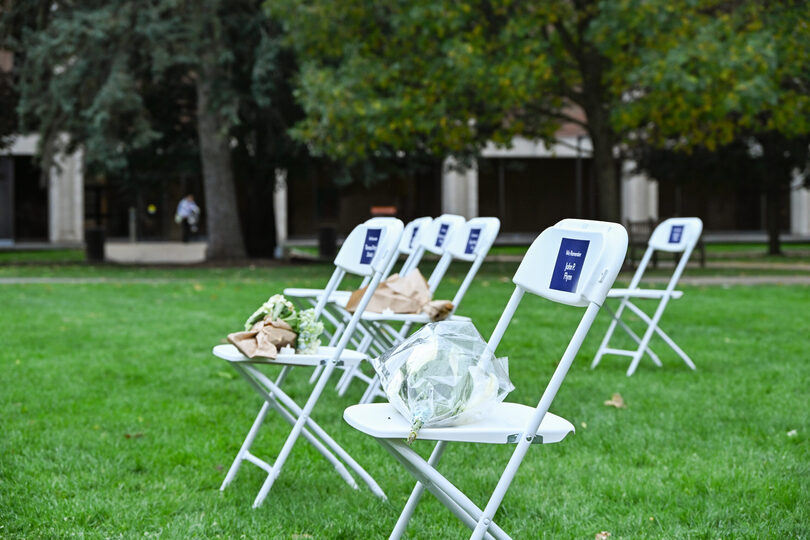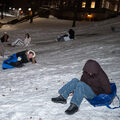Opinion: As a Remembrance Scholar, Lockerbie values must be universally ingrained

As a Remembrance Scholar, our columnist writes SU must mend the gap between how Lockerbie embodies remembrance and how it’s performed. By approaching issues in the political climate with Lockerbie values, SU can stand strong against them. Lola Jeanne Carpio | Contributing Photgrapher
Get the latest Syracuse news delivered right to your inbox.
Subscribe to our newsletter here.
As a Remembrance scholar, I’ve delved into the archives at Bird Library and done the best I can to remember and honor Julianne Francis Kelly. She was a prolific poet and writer, performer and, according to her sister, “wise beyond her years and a good friend to many.”
Reading poems she wrote encouraged me to reflect on the mission of the Remembrance program, envisioning a more effective approach to extend the care and critical understanding of Lockerbie values into ongoing afflictions of domestic political extremism.
The motto, “look back, act forward,” demands comprehensive application. Looking back means recognizing how Lockerbie transformed tragedy into an ethic of sustained care. Acting forward means considering history and our institutional past to advance the protection and amplify the voices of students and professors rather than silencing them.
I’ve been grappling with the undeniable dissonance that’s developed since my time as a Lockerbie ambassador last fall. The contrast between how Lockerbie embodies remembrance and how Syracuse University applies it reveals a troubling reality about institutional relationships to tragedy and care.
Eleven residents of Lockerbie, Scotland, were killed in the Pan Am Flight 103 attack in addition to the flight’s 259 passengers. Wind carried the bodies and debris across an 81 mile-long corridor 845 square miles in area. A catastrophe became generationally entrenched in their community and lives.
They aren’t reminded of this loss annually like we are, but have instead built compassion and remembrance into their daily lives. Our community should do the same.
The “Laundry Women” of Lockerbie collected, cleaned and even reconnected debris of victims’ belongings and memories with their respective families for years after the attack occurred. The entire Lockerbie community joined efforts to help rebuild the fracture that was physically and spiritually left in their town and extended a helping hand to families mourning transnationally.
But at SU, beyond our highly publicized Remembrance Week, most students couldn’t tell you about the attack or understand the Remembrance Scholarship as anything more than a prestigious accolade. We’ve allowed this narrative to abstract tragedy into temporary publicity, placing us in a dangerous zone of trauma exploitation.
The contrast between how Lockerbie embodies remembrance and how Syracuse University applies it reveals a troubling reality about institutional relationships to tragedy and care.Valeria Martinez-Gutierrez, Columnist
While studying abroad in London last fall, I had the privilege of being selected as a Lockerbie ambassador. Subsequently, I traveled to Lockerbie with a group of peers. The same day I arrived, the students learned their scholarship had been discontinued. Watching them mourn what was some people’s biggest dream, I understood this connection is a lifeline. They shared feelings of being left in the dark of what seemed like a sudden decision.
I was happy to see the scholarship reinstated, but my feelings about the lapse of longitudinal care and mission to look back and act forward remain today.
In the current political climate, spreading awareness about political extremism and violence is supposedly central to Remembrance, but we’re failing to properly recognize students and professors whose work is the very transnational activism and solidarity that is suggested in Remembrance’s foundation.
RC Concepcion, for instance, had concluded his time at Newhouse shortly after my article in support of his immigrant advocacy. According to a statement posted on his Instagram, he’s now doubling down on DEICER – a lifesaving app he made available outside app stores after immigrant safety applications were banned. His efforts model the care and kindness of Lockerbie that we should embody in our community, and it’s voices like his we must collectively protect and enhance.
And student movements, like Not Again SU – the longest-running student protest in SU’s history – collectively raised concerns of a series of on-campus hate incidents which university officials waited four days to alert the campus community of. The 31-day sit-in aimed to improve SU’s campus climate for students of color, but now students learn about it in a diluted manner which often fails to thoroughly explain why First Year Seminar was brought to life. Honoring Lockerbie’s legacy is to intentionally build community like student resistance groups have in the past, but collectively.
One way to ensure we properly honor on-campus legacies is through recognition of our distinct relationship to Lockerbie year-round. When presented with moments of student frustration, we must actively stand against the systems of violence, allowing terror and silence to reign today as Lockerbie has taught us to: we must honor the systems of empathy that transcended catastrophe, borders and bias.
As a student leader of the Mexican Student Association, Latine Honors Society and Remembrance, I believe we need to question not just our separation from Lockerbie’s model of care, but how we can apply these values into our everyday lives as SU students.
The question isn’t whether SU’s Remembrance program has value – it does. But we must move beyond our lackluster marketing image and dedicate ourselves to building the kind of care that Lockerbie models not only year-round but also universally.
This means understanding Remembrance beyond brand management. It means recognizing that when we undermine professors and students who epitomize solidarity and resistance, we undermine the very values Lockerbie is meant to inspire.
Lockerbie teaches us that authentic Remembrance requires transforming grief into sustained practices of care – not just for those who passed, but for the living who continue their legacy.
Valeria Martinez-Gutierrez is a senior majoring in geography, sociology and environment, sustainability and policy. Her column appears bi-weekly. She can be reached at vmarti10@syr.edu.






